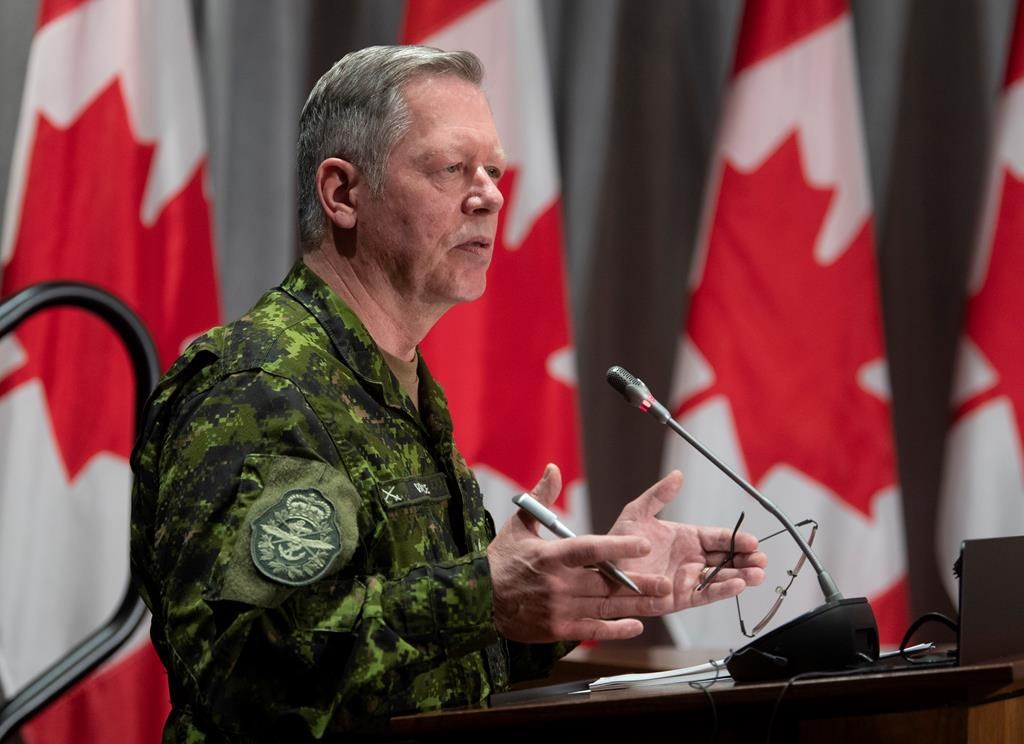After failing to win the backing of Prime Minister Justin Trudeau for his nomination as NATO’s most senior military officer, Gen. Jonathan Vance has announced his retirement from the Canadian Armed Forces.

Vance’s retirement followed a decision by Trudeau to reject Vance’s candidacy to become Military Adviser to NATO’s Secretary-General, Global News reported Thursday.
This was a stunning rebuke to a soldier who has spent 39 years of his life in service to his country, including long assignments in Germany, the Balkans and Afghanistan. It underscores how Canada has increasingly chosen to punch well below its weight internationally in security matters while promoting a progressive agenda overseas that was strongly rejected when Canada tried in June for a seat on the United Nations Security Council.
READ MORE: Gen. Jonathan Vance stepping down from role as Canada’s top soldier
Vance is arguably Canada’s most well-known warrior in more than half a century. The only Canadian general to serve two combat tours in Kandahar and now in his sixth year as commander of all Canadian forces, he was highly respected among Canada’s closest allies, and had been considered a strong favourite for the key job in Brussels.
Nominations for the NATO job must be sanctioned by national governments. Only chiefs of defence can be considered.
The vote on who will succeed Air Chief Marshal Stuart Peach of Great Britain is to be held in mid-September in Rome. Nominations for the position closed on July 16. Poland and the Netherlands have nominated their top generals.

After Ottawa apparently chose not to support his candidacy for Brussels, Vance told Trudeau that he was going to retire from the Armed Forces.

Get daily National news
Because his conversations with the prime minister were always confidential, the general said in an interview that he could not discuss what they talked about.
“I am not angry at all,” Vance said moments after the Department of National Defence announced his impending retirement on social media.
“This is completely and entirely the prerogative of government. They will have their reasons.”
COMMENTARY: Justin Trudeau is WE-deep in trouble
Trudeau’s apparent refusal to support Vance stands in stark contrast to the prime minister’s strong push for a much less influential temporary seat on the United Nations Security Council.
That Vance will not continue his career is a big loss for Canada on the international stage.
That he won’t be in the mix for Brussels is also NATO’s loss. The alliance could use a highly regarded commander of Vance’s skill and vast experience because it faces a difficult and uncertain future. Among the many challenges are extreme budget pressures caused by the economic fallout from COVID-19.
On the diplomatic and operational side, NATO is being tested by Russia’s ongoing provocations in Ukraine and threats to Central Europe, a rise in cyberattacks on western security networks and the rise of China, which has designs on the Arctic and has been trying to buy influence over some NATO states in Europe.
“Knowing that I would be leaving, one way or another, I was quite careful to work to get all the big things underway,” he said. “There are still a few things I want to get done (as CDS) but they are already quite mature.
“I arrived in the job with an agenda and the cupboard is kind of bare right now.”
COMMENTARY: Canada should follow Australia’s example in defence, foreign policy
Vance came under fire several times from the Taliban when out on combat patrols in Afghanistan. The general was deeply affected on a personal level when one of his bodyguards, Cpl. Nick Bulger, was killed only 15 metres away from him when his armoured vehicle struck an improvised explosive device.
“There is nothing like the crucible of conflict to bring you closer to troops and to your profession,” Vance said. “That has left an indelible mark on me. I will always carry the Afghan experience with me. It made me better as a leader and commander. It helped me as the chief of defence staff.
Asked who had the greatest influence on his unusually long career, Vance, who is the army’s senior infantry officer and the senior soldier in the Royal Canadian Regiment, said that as he wrote his letter to the troops on Thursday in which he told them he was relinquishing command, he said his first thought was of “every sergeant-major I ever had from my first, Tom Daigle, in Winnipeg, in 1986, and especially Sergeant-Major Stan Stapleford,” who served with him in Afghanistan.
He said he also remembered the special bond he had with every one of his military drivers.
There is no declared timetable for the prime minister to name his successor, but Vance thought it likely that this would happen before the end of the year.
WATCH BELOW: (June 26, 2020): Gen. Vance discusses the 55 Canadian Forces members who contracted COVID-19 while deployed to long-term care homes

Asked about what qualities his successor would require, the general said, “The most important thing (for the government) is to be comfortable with the person and to have confidence in them. That is critical. Given the bench that they’ll likely select from, they are all proven leaders who have demonstrated merit.”
There would be no farewell tour, but the general said he might do “a battlefield circulation” to where Canadian troops are serving if this was required for the job. However, he said he was mindful of the need for caution because of COVID-19.
What Vance said he was most looking forward to in his retirement was to spend time with family and friends cruising the Rideau River near Ottawa on his boat.
Matthew Fisher is an international affairs columnist and foreign correspondent who has worked abroad for 35 years. You can follow him on Twitter at @mfisheroverseas







Comments
Want to discuss? Please read our Commenting Policy first.